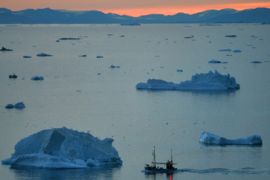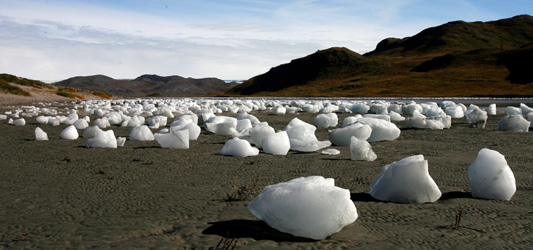UN warns of climate ‘catastrophe’
World’s top scientists say impacts of climate change are potentially irreversible.

 |
IPCC report says the evidence of a human role in global warming is now “unequivocal.” |
The world’s top scientific authority on climate change says the already visible impacts of global warming will accelerate and are potentially irreversible.
Heatwaves, rainstorms, tropical cyclones and surges in sea levels are among the events expected to become more frequent, more widespread and more intense according to new document to be published by the UN’s Intergovernmental Panel on Climate Change (IPCC).
The report to be released on Saturday at the end of the group’s meeting in the Spanish city of Valencia and is the first overview on the greenhouse-gas effect since 2001.
Keep reading
list of 4 itemsAfter the Hurricane
World’s coral reefs face global bleaching crisis
Why is Germany maintaining economic ties with China?
The IPCC report says the evidence of a human role in observed warming is now “unequivocal.”
Banki Ki-moon, the UN chief has called for urgent action on the issue.
“I believe we are on the verge of a catastrophe if we do not act. I am not scare-mongering. But I believe we are nearing a tipping point,” he is as quoted as saying in the International Herald Tribune newspaper.
The IPCC report outlines a scientific consensus on human-induced climate change and indicates that so-called “climate sceptics” who doubt such findings are now firmly a minority.
The publication of the document comes before an international conference is held in Bali, Indonesia, next month to discuss the climate crisis.
The 20-page report, labelled a “summary for policymakers”, is designed to be a guide for politicians facing decisions on cutting pollution from fossil fuels, moving to cleaner energy sources and strengthening defences against drought, flood, storms and other problems that are predicted to increase because of climate change.
The IPCC forecast that, by the year 2100, average global temperatures could rise between 1.1C and 6.4C while sea levels will rise by between 18 and 59cm.
The report says all countries will be affected but poorer nations, which it says are the least to blame, are likely to be the hardest hit.
Developments such as retreating glaciers and declining amounts of snow in alpine regions, thinning Arctic sea ice during the summer show that climate change is already on the march, it says.
The UN Framework Convention on Climate Change (UNFCCC) conference due to be begin on December 3 is to set a “roadmap” of negotiations for intensifying cuts in carbon emissions beyond 2012, when the Kyoto Protocol runs out.
The details of the 20-page summary report supported by a 70-page technical document was outlined by negotiators from more than 140 countries over five days.